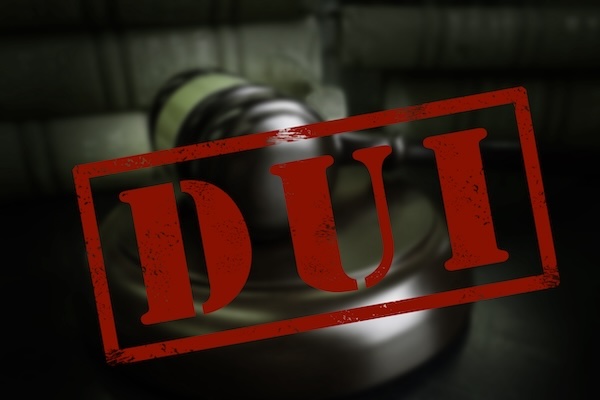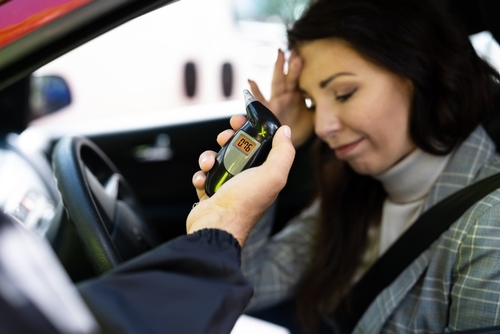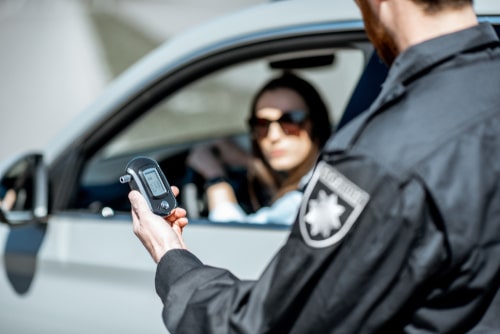DUI field tests for sobriety are a group of tests conducted by the police when they pull a driver they believe is impaired. The test checks the driver’s balance, coordination, and multitasking ability during the field sobriety test. The examination has been validated to prove intoxication in drivers suspected of driving under the influence of drugs or alcohol.
In this article, our Indianapolis drunk driving attorneys look at the types of DUI field tests you can encounter when pulled over by a law enforcement officer. If the police arrest you for DUI, our experienced lawyers can represent you and put up the best defense possible. So, waste no time in contacting us.
Types of Field Sobriety Tests in Indianapolis
There are three types of field sobriety tests you can undergo when pulled over by a police officer. They are the horizontal gaze nystagmus (HGN), the walk-and-turn, and the one-leg stand tests. Below we discuss them in detail.
Horizontal Gaze Nystagmus (HGN)
Horizontal gaze nystagmus is an involuntary jerking of the eyeball. It happens to everyone when the eyes rotate at high peripheral angles. However, in an intoxicated person, the jerking of the eyeballs becomes significantly exaggerated and occurs at lesser angles. While carrying out the horizontal gaze nystagmus test, the police officer will place an object, like a pen or flashlight or a finger, in front of you and ask you to follow it with your eyes.
The officer will then follow your movement to determine:
- If the eye cannot follow the object smoothly
- If the angle of the jerking onset is within 45 degrees
- If jerking is distinct when the eye is at maximum deviation
If the officer determines four or more clues between the two eyes, they will decide that you have a blood alcohol concentration (BAC) of o.10% or greater. According to the National Highway Traffic Safety Administration (NHTSA) research, this test is usually accurate in at least 77% of test subjects. So, it’s enough to secure a DUI conviction against you.
Walk-and-Turn Test
The officer will ask you to take nine steps, heel-to-toe, along a straight line when conducting this test. Then you’ll turn on one foot and return nine steps in the opposite direction. Here, the officer looks for seven indicators of impairment, and if they find it, they’ll likely conclude you’re impaired.
Thus, you’ll be legally impaired if you:
- Start walking before the officer finishes the instruction
- Cannot keep your balance while the officer reads out the instruction
- Your steps do not go heel-to-toe
- Lose your balance while turning
- Stop walking mid-step to regain your balance
- Take an incorrect number of steps
- Use your arm to balance yourself
According to the NHTSA, if you exhibit two or more of the above, there is a 68% chance of having a 0.10% BAC level.
One-Leg Stand Test
In this test, the officer asks you to stand with one foot about six inches off the ground and count from 1,001. You will keep doing this until the officer says that you can put your foot down. Then, again, the officer looks for indicators to determine impairment. They are:
- Putting your foot down
- Using your arms to balance yourself
- Hopping to maintain balance
- Swaying while balancing
The NHTSA says that if a driver exhibits two or more of the above, there’s a 65% chance they have a BAC of 0.10% or greater.
Is It Possible for You To Fail the DUI Field Tests While Sober?
Despite the NHTSA report on the accuracy of the three tests discussed above, they are not infallible. There are numerous reasons why sober people can fail this test, especially the one-leg stand test. Some of these reasons are medical conditions, disabilities, age injury, and taking a specific medication. Also, wearing contact lenses, for instance, can affect how you perform in the horizontal gaze nystagmus test.
The officer is obligated to ask you if there’s a reason why you might not pass the test. They will note your answer in their arrest report. Ensure the officer notes whatever response you give in the report, as it would help your defense later on. Also, mention it to your Indianapolis DUI lawyer.
f you would like to know more information about losing your license if convicted of DUI, visit this page.
Let a Rathburn Law Office P.C. DUI Attorney in Indianapolis Help You!
A DUI conviction has several legal and social consequences, one of which is an imprisonment term. So, don’t play or jeopardize your freedom and future by failing to contact a drunk driving attorney immediately. At the Rathburn Law Firm, we ensure our clients do not get convicted wrongfully by providing excellent legal services. Contact us today for a free case consultation.









